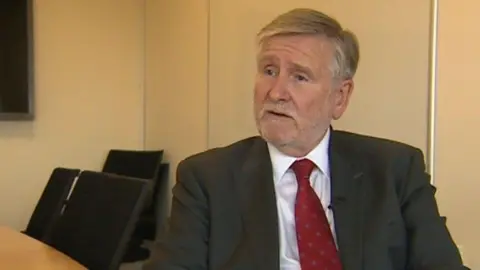Estyn review: 'Stop inspections during curriculum change'
School inspections should be paused for a year while new reforms are brought in, according to a review of the inspectorate Estyn.
It also recommends more emphasis on schools evaluating themselves, with some earning the right to be free of traditional inspections.
One union leader said the ideas would represent "a seismic shift" in school inspection arrangements in Wales.
Estyn said it would discuss the recommendations with schools.
The report by Prof Graham Donaldson was commissioned by Estyn and the Welsh government to consider the future of inspections in the context of the the new curriculum being rolled out in Welsh schools from 2022.
It highlights concerns about a wider "high-stakes" system of measuring schools' performance and recommends a move towards a culture of self-evaluation.
The proposals include:
- A temporary suspension of the inspection cycle for the academic session 2019-20. It would allow inspectors and schools to focus on the new curriculum, and allow Estyn staff to work directly with schools on the reforms. However, schools under special measures would still be inspected.
- Following the pause, inspections would resume with a greater focus on schools self-evaluating and ditching graded inspection reports. Schools' performance would no longer be labelled as excellent, good, adequate or unsatisfactory with evaluations explained in the text instead.
- Ultimately the aim would be for schools to achieve "earned autonomy" where they evaluate their own performance. Those schools would not be subject to inspections but Estyn would play a role in validating the process.
Prof Donaldson, who also designed the new curriculum, said the changes are needed to make sure Wales develops a "high-quality, dynamic education system".
"At the moment we have an approach to inspection and to accountability generally - which is a very blunt instrument - every school gets the same, no matter how good that school might be," he said.
"What we need to do is take a much more tailored and refined programme that allows schools that can be creative and can serve the children well to be given the opportunity to do that and then to ensure the resources of inspection are applied diagnostically to help those schools that are struggling to get better."

He said: "A system that's based on pressure, putting pressure on schools in order to get better only takes you so far.
"On occasions that's necessary, it's important to put pressure on, in order to bring about a change or to challenge complacency."
He added: "You don't build high-quality education systems on fear."
'Seismic shift'
David Evans, Wales secretary of the National Education Union Cymru, said: "The recommendations outlined by Graham Donaldson, if accepted and implemented, will represent a seismic shift in the school inspection arrangements in Wales which will be largely welcomed by the profession as it wrestles with the ambitious educational reforms that are already under way."
Rex Phillips, union NASUWT's national official for Wales, said: "The report appears to steer Estyn back towards the role of 'critical friend' rather than 'common enemy' and that is to be welcomed."
The head of Estyn, chief inspector of education and training in Wales, Meilyr Rowlands, said he was pleased the report highlighted Estyn's "vital role" in enhancing the learning of young people.
Estyn said it would discuss the recommendations with schools.
